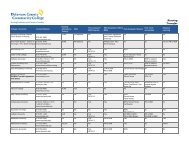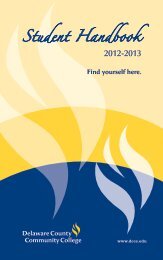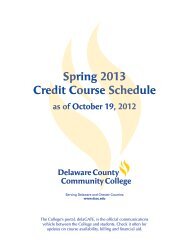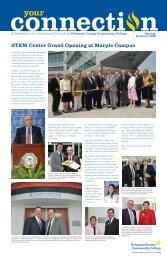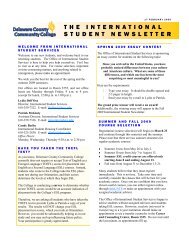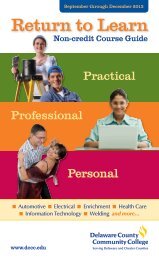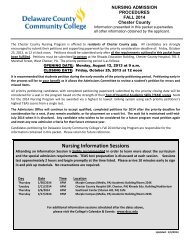2010 Catalog - Delaware County Community College
2010 Catalog - Delaware County Community College
2010 Catalog - Delaware County Community College
You also want an ePaper? Increase the reach of your titles
YUMPU automatically turns print PDFs into web optimized ePapers that Google loves.
130 COURSE DESCRIPTIONS<br />
work experiences/employer evaluations. Thus, a student's<br />
digital portfolio provides the ability to show work on demand<br />
and evidence of their preparation for a multimedia and<br />
Web development career.<br />
The objective of this course is for students to demonstrate<br />
the theoretical as well as the technical skills they have<br />
acquired throughout the program. Students will assess<br />
personal strengths to establish a career goal and decide<br />
how to organize their media design and production work<br />
in a graduation portfolio.<br />
Upon successful completion of this course, students<br />
should be able to:<br />
• Identify the need for a digital portfolio.<br />
• Identify the target audience of a digital portfolio.<br />
• Demonstrate the ability to organize, collect and prepare<br />
material for a digital portfolio.<br />
• Define copyright laws for multimedia and Web<br />
development.<br />
• Demonstrate the ability to design a user interface for a<br />
digital portfolio.<br />
• Demonstrate the use of multimedia and Web software<br />
tools to develop a digital portfolio.<br />
Prereq. IMM 100 or IMM 205 and IMM 120<br />
3 Credits 3 Weekly Lecture Hours<br />
INS 100<br />
(INS) Insurance<br />
Introduction To Insurance<br />
This course introduces students to fundamentals of<br />
insurance with emphasis on claim functions as part of<br />
the industry structure.<br />
Upon successful completion of this course, students<br />
should be able to:<br />
• Characterize fundamental insurance concepts of<br />
reinsurance, underwriting and claims<br />
• Analyze the structure of the insurance industry and the<br />
role of government insurance<br />
• Articulate the role of insurance in our society, including<br />
the ethical guidelines for adjusters<br />
• Identify the principles of risk management<br />
• Describe the functions of the claims adjuster and of<br />
claim adjusting.<br />
3 Credits 3 Weekly Lecture Hours<br />
INS 210<br />
Evidence and Investigative<br />
Principles<br />
A study in the conduct, principles and procedures relative<br />
to investigation.<br />
Upon successful completion of this course, students<br />
should be able to:<br />
• Identify evidence as used in the conduct of<br />
civil investigation<br />
• Provide an overview of the rules and principles of evidence<br />
• Identify and explain hearsay evidence and contrast the<br />
traditional common law exceptions to the hearsay rule<br />
• Research and develop a technique based on a scientific<br />
method whereby a structured inquiry may be conducted<br />
• Develop an investigative narrative report for the following<br />
types of insurance claims: vehicular traffic accident,<br />
arson, commercial and personal property, malpractice,<br />
product liability, workers compensation<br />
and marine<br />
3 Credits 3 Weekly Lecture Hours<br />
INS 211<br />
File Management and<br />
Negotations<br />
An application course in file management and control<br />
with emphasis on psychological principles of human<br />
behavior, motivation, verbal/non-verbal communication<br />
and other general barriers to successful negotiations.<br />
Upon successful completion of this course, students<br />
should be able to:<br />
• Develop the process and procedures to be followed from<br />
the inception of the claim through the investigation,<br />
evaluation, negotiation and settlement phase<br />
• Explain how a knowledge of the concepts of psychology<br />
aid in preparing for negotiation as it requires an<br />
understanding of human behavior<br />
• Identify and explain the various strategies employed<br />
in negotiations<br />
• Discuss the tactic of persuasion and other tactics<br />
employed in dealing with resistance during the course<br />
of negotiations<br />
3 Credits 3 Weekly Lecture Hours<br />
INS 221<br />
Investigation of Death and<br />
Injury<br />
A course directed to medicolegal investigation of death<br />
under a variety of circumstances and applicable tort action.<br />
Upon successful completion of this course, students<br />
should be able to:<br />
• Provide a forensic definition of death<br />
• Differentiate among cause, manner and mechanism of death<br />
• Discuss the law generally with respect to trauma and<br />
disease in civil, tort and worker’s compensation cases<br />
• List the four major categories of death due to asphyxia<br />
• Describe the differences and similarities in the investigation<br />
of death by asphyxia and death by drowning<br />
• Provide a correlation of postmortem finds with roadside<br />
accidents in explaining causes of death and/or the accident<br />
• Explain why it is necessary to identify and separate<br />
various types of lesions<br />
• List and explain some general procedures to be followed<br />
during an autopsy<br />
• Identify the various aspects and reasoning of the<br />
mediocolegal autopsy report<br />
3 Credits 3 Weekly Lecture Hours<br />
INS 222<br />
Arson Investigation<br />
This course enables students to become familiar with the<br />
problem inherent in determining the causes of fires, recognition<br />
of arson, preservation of evidence and successful<br />
prosecution of those responsible.<br />
Upon successful completion of this course, students<br />
should be able to:<br />
• Cite the organization established to investigate causes<br />
and types of arson<br />
• Depict the role of fire personnel in arson suppression<br />
• Detail the significant scientific aids available to the<br />
fire investigator<br />
• Outline the urban and suburban incendiary fire patterns<br />
that have increased in the last decade<br />
• Conduct interviews to establish fire causes<br />
• Write a comprehensive permanent record of a case<br />
and provide guidance in the preparation and conduct<br />
of litigation<br />
• Develop skills essential to offering expert testimony in<br />
civil and criminal arson cases<br />
3 Credits 3 Weekly Lecture Hours<br />
INS 223<br />
Fraud Investigation<br />
This forensic science course applicable to investigation<br />
and case preparation of losses due to crimes of theft<br />
generally. Topics include: home and commercial burglaries,<br />
employee theft, retail theft, cargo and computer theft,<br />
embezzlement-deceptive business practices, fraud, whitecollar<br />
and systematic criminality.<br />
Upon successful completion of this course, students<br />
should be able to:<br />
• Define the legal term of burglary<br />
• Identify the burglar and his skills, and differentiate<br />
between residential and commercial burglaries as they<br />
apply to the burglars’ target selection, equipment,<br />
methods of entry, selection of items and disposal of<br />
goods stolen<br />
• Define the term ‘theft’ and explain completely modus<br />
operandi as it relates to auto theft, theft from building,<br />
employee theft, shoplifting and cargo theft<br />
• Provide an investigative format for the casualty claims<br />
adjuster in handling losses due to burglary and theft<br />
• Identify the governmental,, non-governmental, private<br />
and public sources of information when preparing a<br />
personal background investigation<br />
• Discuss victim-offender relationships, vulnerable victims,<br />
reactions to burglary and theft, resistance, reporting of<br />
burglary and theft, and victims in relation to police officers<br />
as it is relevant to the claims adjuster’s investigation<br />
• Explain how and why the professional claims investigator<br />
of burglary-theft claims should work closely with the<br />
underwriting department of an insurance company<br />
3 Credits 3 Weekly Lecture Hours<br />
INS 230 Liabiality Insurance and<br />
Claims Adjusting<br />
This course addresses the fundamental principles of tort<br />
law application. Evaluation of each type of claim in light of<br />
statute law and defenses to liability area are also addressed.<br />
Topics include: agency bailments innkeepers and carriers,<br />
products, automobiles, professional liability, employer's<br />
liability and worker's compensation.<br />
Upon successful completion of this course, students<br />
should be able to:<br />
• Read, interpret and explain the liability sections from<br />
some typical liability contracts.<br />
• Explain the common-law articulation of rights, duties and<br />
remedies with respect to owners of property.<br />
• List the three major classifications of torts--differentiate as<br />
to the duties, rights and remedies within each classification.<br />
• Explain the following judicial modifications to the law of<br />
torts: fright without impact, mental anguish, consortium<br />
and the center-of-gravity rule.<br />
• Explain the elements of a contract.<br />
• Explain the fundamental principle of the law of agency.<br />
• Discuss the evolution of workmen's compensation to its<br />
present state with regard to rights, benefits and<br />
administration.<br />
• Trace the evolution of products liability law from the<br />
common-law holding of caveat emptor through<br />
application of the law of torts to present statutory<br />
modifications of the contract of sale.<br />
• Explain the standards to which a professional is held for<br />
services rendered.<br />
• Explain the law in terms of rights, duties, responsibilities,<br />
remedies and defenses for professional practitioners.<br />
• Explain the law in terms of rights, duties, responsibilities,<br />
remedies and defenses to liability applicable to<br />
automobile operators, passengers and pedestrians.<br />
3 Credits 3 Weekly Lecture Hours<br />
INS 231<br />
Seminar in Insurance Problems<br />
This course is topical in nature and relevant to particular<br />
contemporary problems in producing insurance or adjusting<br />
claims. The primary purpose of studying problems,<br />
limitations or challenges is to learn how to overcome such<br />
issues as a practical matter. This course will provide an<br />
overview of the insurance marketplace. It is intended to<br />
help you prepare to take the Producer licensing exam or<br />
help you become familiar with Claims adjusting.<br />
Upon successful completion of this course, students<br />
should be able to:<br />
• Identify and explain the need for personal lines<br />
of Insurance<br />
• Know the ethical considerations in producing personal<br />
lines Insurance<br />
• Delineate teh differences in various lines of Accident, Life<br />
and Health Insurance<br />
• Prepare to take the Insurance Producer Exam<br />
3 Credits 3 Weekly Lecture Hours<br />
DELAWARE COUNTY COMMUNITY COLLEGE




